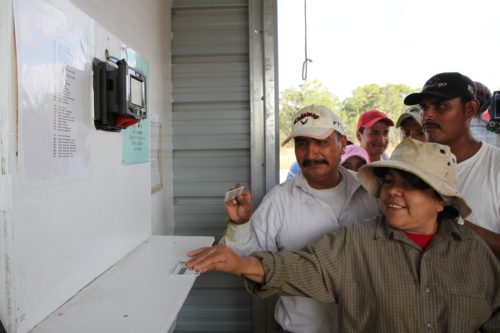For generations, farmworkers have suffered from levels of poverty and abuse unparalleled in the US labor market. Well-documented challenges in the workplace have included physical and verbal abuse, rape and widespread sexual harassment, discrimination, and high fatal and non-fatal injury rates. Farmworkers have also faced endemic wage theft, resulting in widespread violation of minimum wage laws.
In the extreme, farmworkers have faced situations of forced labor. In these instances, workers have been held against their will, with the threat or actual use of violence, and forced to work for little or no pay. Several of these cases, some involving hundreds of workers, have been successfully prosecuted by the US Department of Justice over the past two decades. The Coalition of Immokalee Workers (CIW), a farmworker organization based in Florida, has worked on the investigation and prosecution of nine such cases with federal law enforcement agencies since 1997 alone.
In 2001, the CIW launched the ambitious Campaign for Fair Food to educate consumers on the exploitation behind the food they eat. The campaign is an effort to get at the roots of farmworker poverty and abuse through an analysis that places much of the responsibility for degraded farm labor conditions at the feet of the multibillion-dollar retail food corporations. According to this analysis, retail food giants leverage their unprecedented volume purchasing power to drive prices down at the farm gate, where falling prices are translated into downward pressure on farmworkers’ wages and working conditions by farms looking to maintain shrinking margins. Through the campaign, farmworkers and consumers have built an alliance that encourages retail food companies to reverse the impact of their enormous economic leverage by agreeing to only purchase from suppliers who meet fundamental human rights standards and to pay a small premium to help improve farmworkers’ falling incomes. This alliance has won Fair Food Agreements with more than a dozen of the world’s largest food companies.
As a result, the Fair Food Program (FFP) – the first comprehensive, fully functional model of the Worker-driven Social Responsibility paradigm – was launched across the 30,000-acre, $650 million Florida tomato industry in 2011. The FFP is a pathfinding collaboration premised on risk prevention, supply chain transparency, and the verifiable, market-enforced protection of workers’ rights. By requiring retail food companies to pay a small premium, the FFP helps reverse decades of worsening farmworker poverty. By requiring Participating Buyers to only purchase tomatoes from growers who comply with the Fair Food Code of Conduct, the FFP harnesses retailers’ immense purchasing power to enforce the most progressive labor standards in US agriculture today.
The success of the FFP has also driven its expansion to several large tomato farms in Georgia, North and South Carolina, Virginia, Maryland and New Jersey, as well as into green bell peppers and strawberries in Florida. The Program is in the process of expanding into Texas citrus and melons and other crops and US states. Lastly, the Program has launched a consumer-facing Fair Food label which will help to foster and harness consumer demand for ethical production while creating additional value for growers and retailers alike.

Workers use a verifiable timekeeping system, as required under the Fair Food Code of Conduct.
Specifically, under the FFP, Participating Growers have agreed to:
- Pass on the premium retailers pay for their produce to their workers in the form of a bonus (the premium is often referred to as a “penny per pound,” though the amounts vary according to crop variety);
- Compliance with the worker-drafted, human rights-based Fair Food Code of Conduct, including zero tolerance for forced labor, child labor, violence and sexual assault;
- Worker-to-worker education sessions conducted by CIW on the farms and on company time to ensure that workers understand their new rights and responsibilities under the Program;
- A worker-triggered complaint resolution mechanism leading to investigation, corrective action plans, and, if necessary, suspension of a farm’s Participating Grower status, and thereby its ability to sell to Participating Buyers;
- Health and safety committees on every farm to give workers a structured voice in shaping a safer, more humane work environment;
- Concrete changes in harvesting operations that go beyond existing legal protections to improve workers’ wages and working conditions, including an end to the age-old practice of forced overfilling of harvesting buckets (a practice which effectively denied workers’ pay for up to 10% of the tomatoes harvested), the provision of shade in the fields, and the use of time clocks to record and count all compensable hours accurately; and
- Ongoing comprehensive audits of Participating Growers’ operations by the Fair Food Standards Council to ensure compliance with each element of the Program.
The Fair Food Program has resulted in unprecedented changes on participating farms and has won praise from human rights observers across the spectrum, including the US Departments of Justice, Labor, and State; the EEOC, the United Nations Working Group on Business and Human Rights; and numerous non-governmental organizations, from the Franklin D. Roosevelt Foundation to the James Beard Foundation. It has been described it as “the best workplace-monitoring program” in the U.S in The New York Times, and was listed among the 15 “most important social-impact stories of the past century” in the Harvard Business Review. In 2015, the CIW received a Presidential Medal for the Program’s “extraordinary effectiveness combatting human trafficking.” More recently, the United Nations Special Rapporteur on Trafficking in Persons described the FFP as “an international benchmark” in the fight against modern-day slavery, and the MacArthur Foundation called the FFP “a visionary strategy… with potential to transform workplace environments across the global supply chain,” in awarding the CIW with a 2017 MacArthur “genius” grant.
Hoja de Información: Programa por Comida Justa
Additional Resources